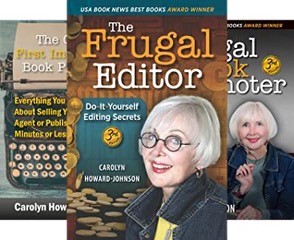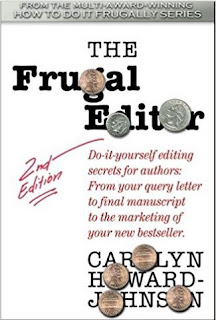How to Avoid Embarrassment Using the History of Words
When Is Nice Anything but Nice
By Carolyn Howard-Johnson, author of the newly released
Third Edition of The Frugal Editor
My favorite resources for keeping up with ever-shifting English grammar appear to be games at first glance, something I prefer not to waste my time on but somehow also get hooked on. Still, I have several quickie newsletters that appear in my mailbox because with the first few—the likes of Word Genius and Word Smart—I realized they were great tools for editors—and for those occasions when all writers choose to break that rule about always hiring a professional editor. You know when you do it, and I know when I do it—usually when I’m in a hurry or when I’m writing promotional material. Ahem!
I sometimes break another rule, too. I subscribe to these letters when new ones arrive unbidden, unannounced, and unrecommended. As an editor who knows that smart editors need to hire editors whenever possible, too, I find they help me keep my skills ahead of the curve. That I have never unsubscribed is informal proof of their value.
Sometime in about 2023 one of these letters asked, “Have you ever stopped to think about the true meanings behind the words we use every day? While we may use these words without a second thought, they often carry deeper significance and historical context that we may not be aware of… .”
That quotation lead me to the word nice which I have long subconsciously avoided. And I have recently been annoyed with a new series of TV ads—probably a very expensive one—that assumes women everywhere prefer the word “nice” over “artistic,” “stylish,” or any of the other possibilities listed in about any thesaurus a writer might use. The producers must have no notion of the word’s history or even a built-in awareness that there might be times it is better avoided.
Of course, we have all used nice to mean something agreeable. But originally it meant something quite different and, as words are prone to do, morphed over time. Think of the word bad as a recent example of just such a change. Occasionally one of those alphabetical generations who began to use it to mean its opposite. I am aware of it, but it still throws me for a loop when they do!
A caveat: When you’re writing, you can’t count on the tone of voice to indicate satire. There are ways to do it with dialogue, description, context. But you have to identify the problem to use one of those techniques.
Nice derives from the Latin nesius which means unknowing or ignorant. That eventually changed to suggest foolish or simple before landing on its current most-commonly used meaning. Still, occasionally we become aware of its double meaning, usually from the tone of voice used to indicate irony as in “Well, ain’t that just nice.” When the word nice comes to mind for us writers, it might be a good time to click on the synonym feature of your word processor to find a word that is less loaded with hidden meanings.
Take special care with some words or phrases being used in the news these days. They have come to be referred to as dog whistles. In politics it might be referred to as code. You might not catch the meaning, but the most radical members will. Some of their history might impart an unintended association with the humankind’s least admirable tendencies. Of course, when you spot one it’s your decision to use it…or not.
-----
With each issue of Karen Cioffi’s #WritersontheMove blog, Carolyn Howard-Johnson shares something writer-related she hopes might save some author from embarrassment (or make the task of writing more fun or creative). The third edition of The Frugal Editor from Modern History Press includes a chapter on some of the words most misused by the very people whose business it is to know them and to give publishers and authors the exposure needed to reach bestseller status. It is the second multi award-winning book in her HowToDoItFrugally Series of books for writers with lots of those important changes in it like the new uses for gender pronouns and a chapter on how backmatter can be extended to inform readers as well as nudge book sales all within the realm of acceptable practices—ancient or new. Find it on Amazon’s new buy-page offered in for paper, hard cover, or e-book series. (The availability of that new page for book series Amazon offers authors is another of the #FrugalBookPromoterTips she posts on Twitter (X).)























